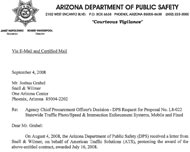9/8/2008
Arizona Overlooks Illegal Use of Speed CamerasArizona Department of Public Safety gives speed camera vendor a pass for violating federal law.

Two photo radar vendors are continuing their battle over a statewide speed camera contract in Arizona where the final outcome could end up being decided in state court. On Thursday, the Arizona Department of Public Safety (DPS) declined to act on charges that Redflex, the Australian company selected to operate up to 200 cameras on behalf of the state, had violated the law by ignoring Federal Communications Commission (FCC) regulations. Rival vendor American Traffic Solutions (ATS) issued a formal contract challenge in August after it had learned that the radar units Redflex had been using were not approved for use in the United States (details).
"Each party has expended considerable effort to convince me its interpretation of the FCC laws and regulations pertaining to certification of radar is correct and the other's is wrong," DPS Chief Procurement Officer Lu E. Himmelstein wrote. "I find no need to resolve the technical dispute between ATS and Redflex."
The DPS letter focused on the narrow issue of whether Redflex was responsive in its contract bid. Himmelstein ruled that because Redflex never specified the particular manufacturer of the radar units in its proposal to the department, it does not matter that the devices could not be legally used. Since Redflex offered to correct the problem, it complied with all terms of the contract. The department also dismissed the evidence cited by ATS as proof that Redflex had full knowledge that its radar units were uncertified.
"Regardless of whether Redflex knew of the FCC certification issues at the time it submitted its offer, once it became aware, it expeditiously agreed to obtain FCC certification," Himmelstein wrote. "Therefore, this issue is now moot in addition to not affecting responsibility."
DPS has been pushing forward on the ticketing program, expected generate $165 million worth of tickets, at the request of Governor Janet Napolitano (D). Camera vendor ATS showed no signs of backing down on its protest.
"The integrity of our industry remains our utmost concern and priority," a company spokesman said in a written statement. "These are substantial issues and should not be ignored, as DPS has done here. There are more steps in this process, and we intend to pursue them."
Although obscure, the FCC certification procedures are grounded in a concern for public safety. In May 2003, Britain's Radio Communications Agency documented an incident where a London family's baby monitor began interfering with air traffic control radios at Luton Airport three miles away. Instead of hearing instructions from a control tower, for several hours some pilots heard the sounds of a baby crying.
"Whatever our equipment authorization procedures, there will remain a danger that some products will not be designed to minimize the danger of interference," former FCC Commissioner Susan Ness explained during a 1998 proceeding simplifying certification procedures. "And there will also remain a problem of individuals who construct or operate transmitting devices with disregard for our rules. Our responsibility to prevent harmful interference can only be fulfilled if we are prepared to follow through with credible enforcement."
The FCC has yet to respond to the ATS complaints over the Redflex use of uncertified radar. An excerpt from the DPS response letter is available in a 165k PDF file at the source link below.


